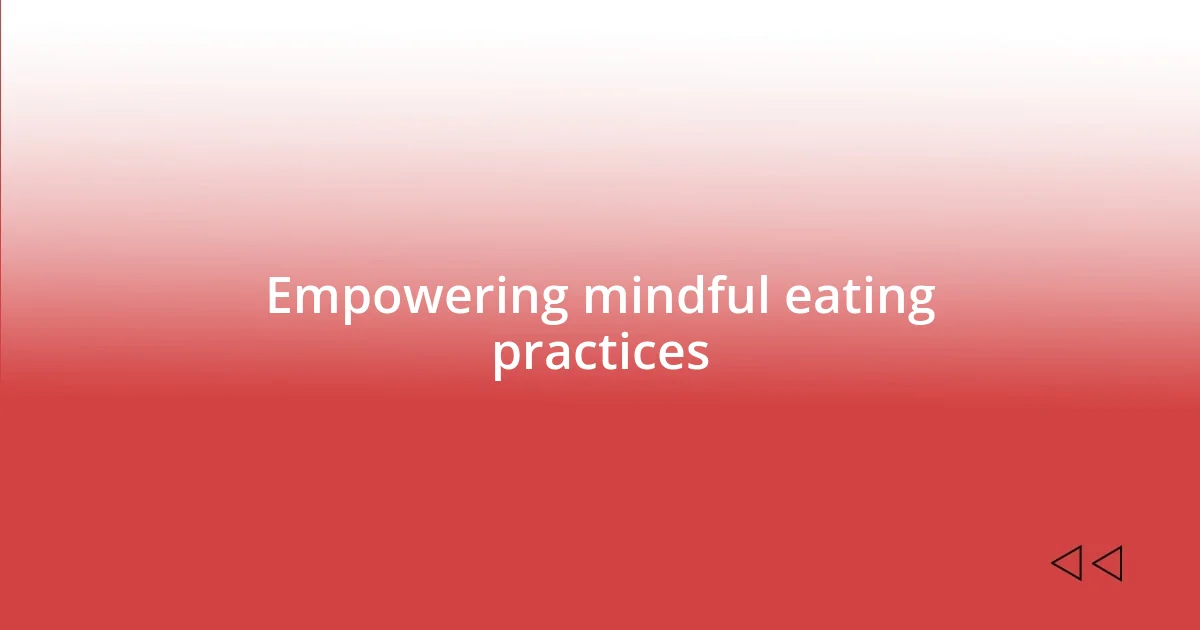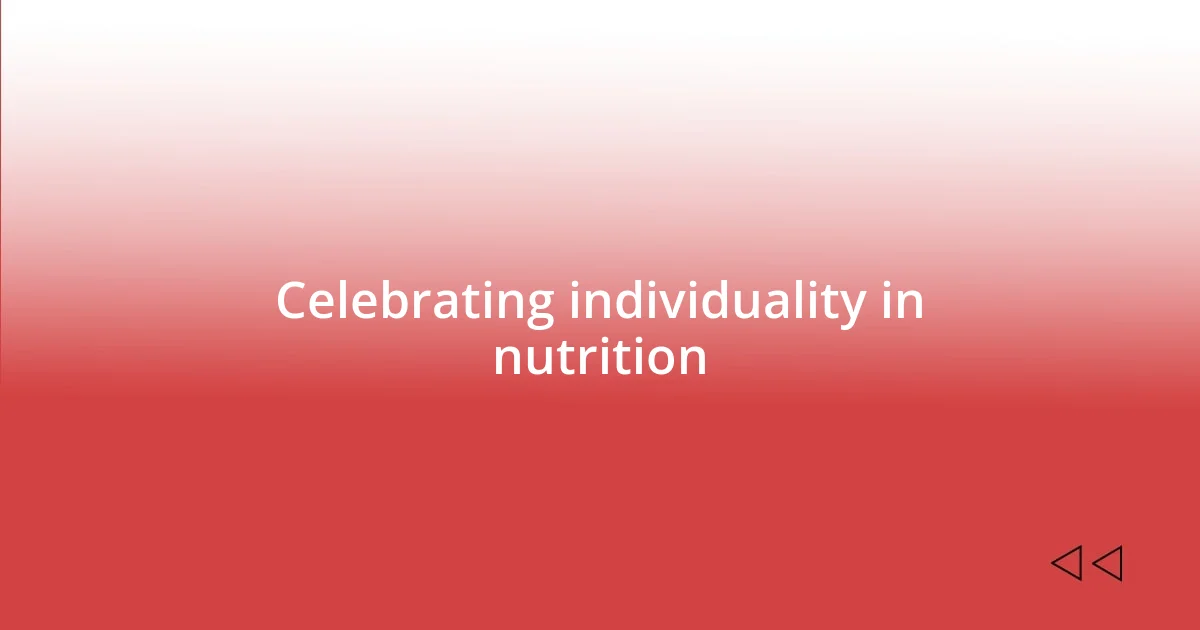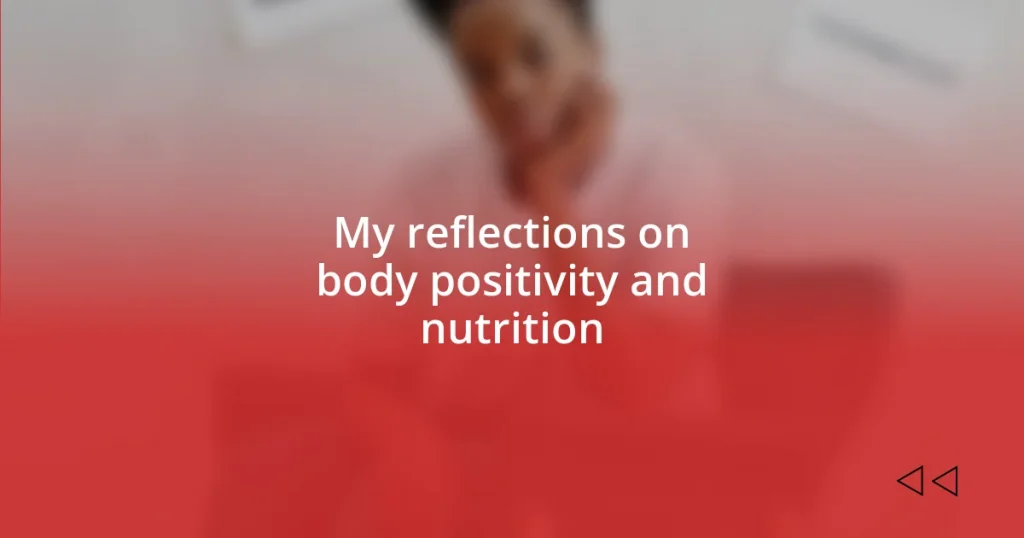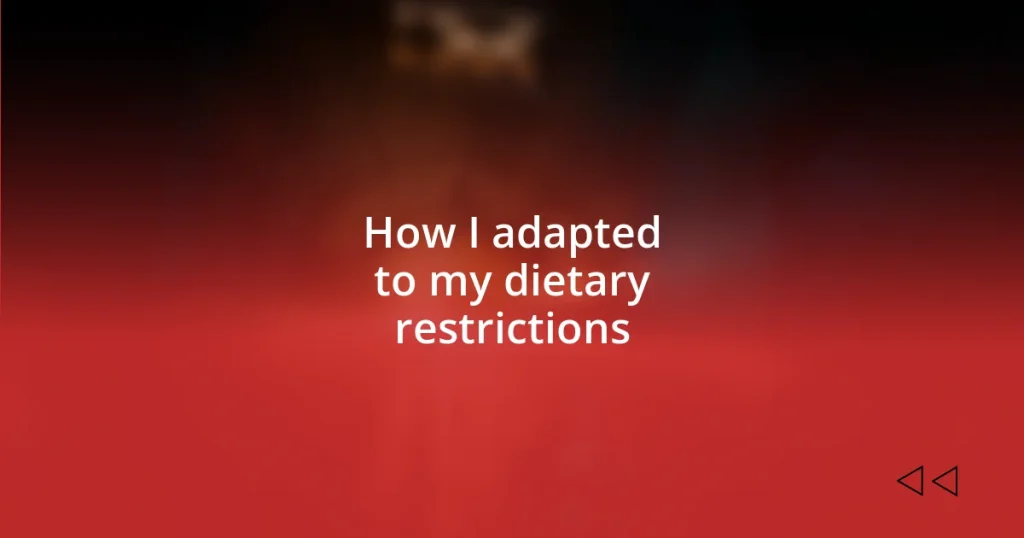Key takeaways:
- Body positivity focuses on self-acceptance and understanding that worth is not tied to appearance, emphasizing the importance of embracing imperfections.
- Mindful eating practices can improve the connection with food, highlighting the importance of savoring meals, recognizing hunger signals, and creating a distraction-free environment.
- Coping with body image issues and fostering a supportive environment through positive influences and personal reflections can lead to greater self-acceptance and joy in both eating and body appreciation.

Understanding body positivity
Body positivity isn’t just a trend; it’s a profound movement rooted in self-acceptance. I remember a time when I looked in the mirror and criticized every little flaw. It’s eye-opening to realize that our bodies are more than just appearances; they reflect our unique stories and journeys.
When I think about body positivity, I can’t help but consider how society constantly bombards us with unrealistic ideals. Have you ever felt the pressure to conform to a certain look? I know I have. This relentless comparison can cloud our opinions of ourselves, making it essential to reclaim the narrative and embrace our imperfections.
In my experience, body positivity isn’t purely about loving every inch of our bodies; it’s about understanding that we are worthy of love and respect regardless of our shape or size. Engaging in conversations around our feelings related to our bodies can be empowering. It’s a journey, and each step towards self-love is worth celebrating.

Empowering mindful eating practices
Mindful eating has transformed the way I interact with food. I recall a moment when I was mindlessly munching on snacks while scrolling through my phone. It hit me; I wasn’t truly enjoying what I was eating. Now, I focus on savoring each bite, which has not only improved my relationship with food but also made me more aware of my body’s hunger signals. Listening to my body has become a ritual I treasure.
Here are some empowering mindful eating practices to consider:
- Pause Before Eating: Take a moment to breathe deeply and center yourself before meals. This helps foster a calm atmosphere around eating.
- Engage All Senses: Notice the colors, textures, and smells of your food. Engaging your senses can heighten your enjoyment.
- Chew Slowly: I’ve found that savoring each bite not only enhances flavors but also allows me to better gauge my fullness.
- Set a Distraction-Free Environment: Dine away from screens. This helps keep my focus on the meal and promotes a more satisfying experience.
- Practice Gratitude: Reflect on where your food comes from and the effort it took to bring it to your table. This has helped me appreciate my meals on a deeper level.
Embracing these practices has genuinely enriched my connection to food, paving the way for a healthier life both emotionally and physically.

Challenging societal food norms
Challenging societal norms around food is something I’ve found essential to my journey. I remember sitting at a family dinner where everyone discussed diets and restrictions rather than savoring the meal. That moment sparked a realization: why must food be tied to guilt or obsession? Embracing food for joy rather than merely a means to an end has reshaped how I see dining experiences. It’s liberating to break free from that cycle and enjoy what’s on my plate.
Often, we face the overwhelming pressure to fit into cookie-cutter dietary trends. I used to jump on every popular diet bandwagon, convinced that each new fad was the key to happiness. Yet, every time I strived to conform, I lost a piece of my authenticity. By rejecting societal food norms and listening to my body’s unique needs, I learned to prioritize nourishment over restriction. This shift has helped me foster a healthier relationship not only with food but also with myself.
It’s crucial to celebrate diversity in our eating habits. Just like our bodies, our nutritional needs are unique. I vividly recall a friend who struggled with a restrictive diet that left her exhausted and unhappy. It was a turning point when she embraced intuitive eating – recognizing and honoring her food cravings without shame. This journey toward self-acceptance helped redefine our conversations about food, emphasizing enjoyment and balance rather than compliance with arbitrary rules.
| Societal Norms | Challenging Perspectives |
|---|---|
| Dieting Fads | Listening to Your Body |
| Food as Guilt | Food as Joy |
| One-Size-Fits-All | Individual Nutritional Needs |

Coping with body image issues
Coping with body image issues can feel overwhelming at times, but I’ve found that creating a supportive environment makes a world of difference. I recall a day when I stood in front of the mirror, scrutinizing every perceived flaw. Instead of focusing on those imperfections, I chose to celebrate something I loved about myself—my smile, for instance. This small shift in perspective was not easy, but it started to build a bridge toward self-acceptance.
I also discovered that surrounding myself with positive influences—people who uplift and encourage rather than critique—has been incredibly helpful. Once, during a casual lunch with friends, I noticed how we all leaned into playful banter about our quirks, rather than our waistlines. It struck me; we’re so much more than our bodies. This realization fueled my desire to engage with body-positive communities, where the conversation shifts to self-love and empowerment. Have you ever thought about who you surround yourself with?
One practical strategy that I’ve employed is to keep a journal dedicated to body positivity. I write down affirmations and experiences that resonate with me. I remember one entry where I described a day at the beach, feeling the sun on my skin and laughing with friends without a single worry about how I looked. That memory has become a touchstone reminding me that joy and connection often eclipse physical insecurities. Turning my attention toward moments of happiness helps me cope, and I encourage everyone to explore their own joyful memories as a source of strength.

Creating a balanced nutrition plan
Creating a balanced nutrition plan involves truly listening to your body’s signals. I recall moments when I was too focused on calorie counting, missing out on the pleasure of food. When I shifted my focus to what my body craved and needed, I discovered that nourishing myself isn’t just about numbers; it’s about honoring my senses and satisfaction.
It’s essential to incorporate a variety of foods in your meals. I learned this firsthand when I consciously started adding colorful fruits and vegetables to my plate. The experience transformed my meals from monotonous to vibrant and exciting! Have you ever explored the different flavors that nature has to offer? I found that mixing textures and tastes not only made eating more enjoyable but also provided my body with the diverse nutrients it craved.
Planning meals can also be an opportunity for creativity. I remember the first time I tried meal prepping for the week—it felt like a game changer. By dedicating just a few hours on the weekend, I could ensure that healthy, balanced meals were ready to grab on busy weekdays. Plus, having homemade options at my fingertips prevented me from relying on takeout, which often left me feeling sluggish. What’s your favorite go-to meal to prep? Finding a few reliable recipes not only makes nutritional planning easier but also keeps me looking forward to my meals, turning the process into a joy rather than a chore.

Celebrating individuality in nutrition
Celebrating individuality in nutrition is something I truly cherish. Each person’s relationship with food is unique, shaped by their cultural background, personal experiences, and preferences. I often think about family gatherings where traditional dishes hold specific memories. For instance, my grandmother’s spicy lentil soup always brings me comfort and warmth, reminding me that nutrition can be a celebration of heritage and love.
It’s fascinating how some days, I crave a hearty salad loaded with crunchy vegetables, while other days, I long for something warm and soothing, like a creamy risotto. This ebb and flow of desires illustrates the importance of tuning into our bodies and honoring what they need. Have you noticed how your cravings change with the seasons or your mood? Just last week, after a long day, I found myself reaching for a bowl of fruit instead of my usual snacks. That simple choice made me feel more connected to my body and its needs.
I believe it’s crucial to embrace the fact that there’s no one-size-fits-all approach to nutrition. Take, for instance, my friend who thrives on plant-based meals, while another finds energy in a balanced mix of proteins and carbs. Each choice reflects our individuality and life experiences. I often ask myself, what does nourishment mean to me? For me, it’s a blend of flavor, health, and joy, and I encourage everyone to explore their own definitions of nutritious eating. Celebrating our unique paths not only enhances our understanding of nutrition but also deepens our relationship with food and ourselves.















